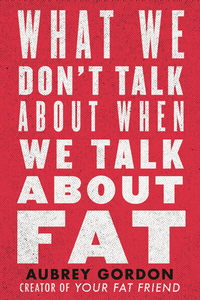You need to sign in or sign up before continuing.
Take a photo of a barcode or cover
challenging
emotional
hopeful
informative
medium-paced
informative
reflective
Long time listener of Maintenance Phase, this book does a good job of expanding upon anecdotes that Aubrey has shared on the podcast. It suffers from something that many nonfiction books do in that it maybe isn't long enough to be a book, and because of this anecdotes and studies are repeated in multiple chapters, at time word for word.
A compelling and thorough examination of anti-fat bias in various arenas of public and private life. Though I felt several parts were a bit repetitive of themselves, in general Gordon very decisively puts forth a case for fat justice and demands of the reader reflection, attention, and action.
This book is obviously a book with an agenda. And that agenda is one that I wholeheartedly agree with in premise.
However, I found that the arguments in this book towards recruiting others who are not familiar with the space to be wholly unconvincing. I felt that the statistics and studies and many examples were cherry picked to prove a point, and I could easily come up with counterpoints ignored for the sake of proving the author's point. (For example, when discussing fat characters portrayed negatively, the author mentions Vernon and Dudley Dursley from the Harry Potter novels, who are admittedly despicable and their fatness exists very much to drive home this point. However, I might also bring up Neville Longbottom, a character repeatedly described as fat, but who has a story and arc that culminates in heroic acts while having nothing to do with his size (not to give anything away)). This is only one single example of a short-sighted, narrow perspective from a book that I found to be rife full of them.
I read this book because I believe in it's main thesis, but I would not recommend it to others, because I found it to have major holes in many of its arguments that would be picked apart by those who would have most to gain by hearing its message.
On top of that, while I found some of it engaging to read (the first and the last chapters especially), much of the writing was repetitive and failed to pull me back to wanting to pick it back up again and continue when I had set it down. Not a waste of time.. But, I'll still be on the lookout for books on this subject that are more convincing and compelling.
However, I found that the arguments in this book towards recruiting others who are not familiar with the space to be wholly unconvincing. I felt that the statistics and studies and many examples were cherry picked to prove a point, and I could easily come up with counterpoints ignored for the sake of proving the author's point. (For example, when discussing fat characters portrayed negatively, the author mentions Vernon and Dudley Dursley from the Harry Potter novels, who are admittedly despicable and their fatness exists very much to drive home this point. However, I might also bring up Neville Longbottom, a character repeatedly described as fat, but who has a story and arc that culminates in heroic acts while having nothing to do with his size (not to give anything away)). This is only one single example of a short-sighted, narrow perspective from a book that I found to be rife full of them.
I read this book because I believe in it's main thesis, but I would not recommend it to others, because I found it to have major holes in many of its arguments that would be picked apart by those who would have most to gain by hearing its message.
On top of that, while I found some of it engaging to read (the first and the last chapters especially), much of the writing was repetitive and failed to pull me back to wanting to pick it back up again and continue when I had set it down. Not a waste of time.. But, I'll still be on the lookout for books on this subject that are more convincing and compelling.
Read it. Fight fatphobia. Be a hot fat bitch.
I love to see people reading this book. it makes me happy to know that others are learning how to fight against fatphobia that kills people every year
I love to see people reading this book. it makes me happy to know that others are learning how to fight against fatphobia that kills people every year
i think this is a really accessible and introductory book into fatphobia and fat justice. gordon includes a mix of anecdotes and educational material, but i was expecting more deep content out of this book. i ended up feeling like this was a book designed to introduce thin people to the existence of fatphobia (and it fills a necessary role in doing so) and i was hoping for more time other than the final chapter being spent exploring directions for justice
THIS IS NOT A DIET BOOK. This is both a thoughtful memoir of life in a larger body and a thorough and well sourced debunking of diet and nutrition myths and quackery. An important read.
A friend recommended the podcast Maintenance Phase to me a few months ago, and it is an understatement to say that listening to it changed my life. I felt like I had a moment straight out of The Matrix: I "woke up" and saw the vast machinery of anti-fat bias and diet culture and capitalism all converging on our bodies, convincing us of their moral value or degeneracy, keeping us forever on the hamster wheel of weight loss. I've spent basically my whole life feeling too fat, and I have a hard time remembering not trying to lose weight. Disordered eating habits and thoughts about food have clutter my mind for years, and for the first time, I felt like someone was finally telling the truth about fatness and our attempts to get rid of it. I also thought the podcast's critique of research was a godsend in a time when specious claims vaguely indicated by a flawed study are treated as gospel. This is all to say that I was very excited to read Aubrey Gordon's What We Don't Talk About When We Talk About Fat, and broadly speaking, I learned a lot from this book. First, a few criticisms: if you've listened to Maintenance Phase, much of what is in this book is not new. I also found the format of the chapters in this book a bit lacking–Gordon often starts with personal anecdotes and after a few pages gets into some research. I found myself wishing that things were a bit more evenly mixed, but perhaps that's just me. Some of the things I loved about this book: it provides a lot more context and detail around some of the anecdotes Aubrey has discussed on the podcast. More than this, thought, it makes a pretty convincing case that the negative health outcomes currently attributed to obesity are actually caused by frequent extreme attempts to lose weight. After reading, I've noticed the pervasiveness of anti-fat bias, to the point that it feels insurmountable. But I'm heartened by the fact that this book has been published, and I hope a lot of people read it and take it seriously.
challenging
informative
medium-paced
Feels a little dated now, 5 years later and in the age of Ozempic, but the topics are certainly still resonant. Probably going to use this for an anti-fat bias talk with my coworkers. Wish there was a little more intersectionality spread throughout.
hopeful
informative
reflective
medium-paced
Gordon offers a poignant and compelling look into the historical, medical, and cultural factors that perpetuate anti-fat bias in our society. Her main thesis is that fat people-like straight sized people-are humans who deserve love, respect, and access to resources to have a full, complex life without seeing their bodies as a tragic moral failing, a medical disease, or some temporary stasis on the road to thinness. Gordon explores the many ways society and its institutions perpetuate anti-fat bias. She calls for everyone (particularly straight size people) to be more aware AND take action against the structures.
Gordon weaves in her own experiences to amplify deep, rooted, beliefs, and practices that it reinforce by society that values thinness as a marker of moral priority to its opposite, fat, a moral failing. She disabuse us the argument that fatness is 1) completely self-perpetuated 2) a signifier of worth, and value and 3) a signal to a lack of health. In particular, Gordon challenges the reader to look beyond what is often presented as causal evidence that being fat or obese is inherently in unhealthy, particularly because some people’s body types naturally are larger.
Gordon’s most compelling chapter is “such a Pretty Face” wherein she explores and deconstructs long held and interwoven notions of fatness, love, and attraction. She uses poignant pop culture examples in TV and film to reinforce her argument that society devalues and dehumanizes fat people through portraying one-dimensional characters often used as comedic relief.







